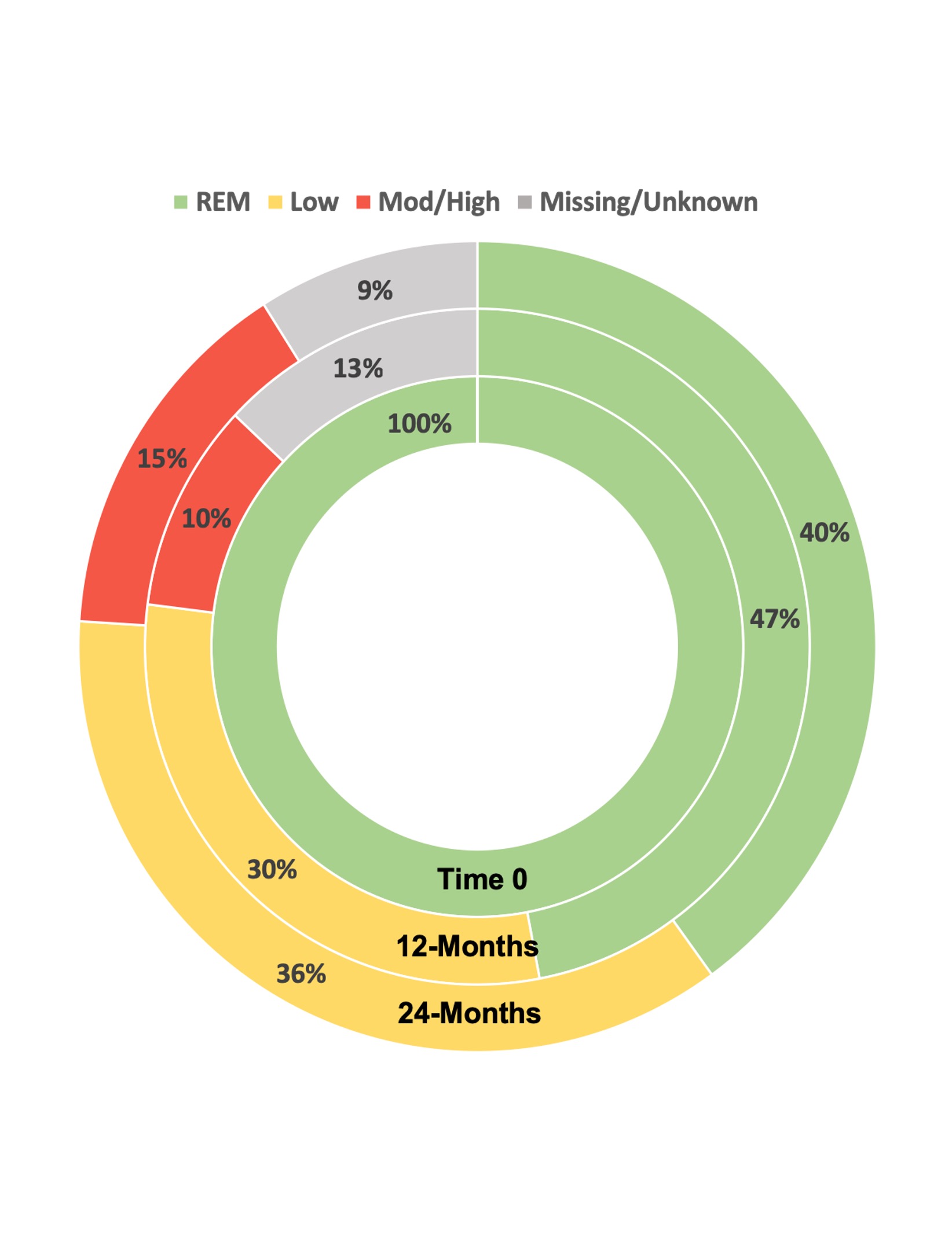Session Information
Date: Monday, November 9, 2020
Title: RA – Diagnosis, Manifestations, & Outcomes Poster IV: Lifespan of a Disease
Session Type: Poster Session D
Session Time: 9:00AM-11:00AM
Background/Purpose: Early diagnosis and rapid initiation of DMARDs following a treat-to-target approach have made remission a realizable goal for many persons living with RA. Despite contemporary improvements in early RA remission outcomes, less is known about: How often, and how long remission is sustained for, and what factors may contribute to loss of remission/ disease control over time. The objective of the present study was to describe longitudinal patterns of remission in real-world early RA patients over a 12-24 months follow up period.
Methods: Data were from participants enrolled in the Canadian Early Arthritis Cohort (CATCH), a prospective study of “real-world” early RA patients (symptoms < 1 year) treated in rheumatology clinics across Canada from 2007- 2019. The study sample was limited to patients with active disease at enrolment who later reached remission (SDAI< =3.3) and were followed for 12-24 months post-remission. SDAI remission status over the 12-24m follow up period was classified into 3 patterns: Pattern 1 - Sustained remission (REM → REM); Pattern 2 - Transient remission (REM → LDA), and Pattern 3 - Transient remission (REM → MDA/HDA). Multi-adjusted multinomial regression was used to identify predictors of transient remission patterns (Pattern 2 and Pattern 3) vs. sustained remission (Pattern 1), respectively.
Results: Among all early RA patients enrolled in CATCH, 1691/ 3054 (55%) had ever reached SDAI remission. Among those that reached remission, 1,419 completed at least 12-24 months of study follow-up post remission and were included in the present study. At study enrolment, most were female (70%), mean(sd) SDAI disease activity was high (27(15)) and most patients (92%) were being treated with csDMARDs. Over the follow up period, 47% of patients sustained remission by 12-months and, only 40% by 24 months (Figure). Transitions from REM→LDA (36%) were more common than REM→MDA/HDA (15%) by 24 months (Figure).Female sex, smoking, higher comorbidity index and positive serology, were significantly associated with transient remission patterns (Table). Results also suggest possible associations between transient remission patterns and older age, longer time to first remission, lack of early MTX treatment and reducing treatment after remission, but confidence intervals were inconclusive (Table).
Conclusion: Results of this large longitudinal study suggests that < 50% of real-world early RA patients that reached remission, sustained remission for 12-24m. Closer monitoring of RA patients with prognostic indicators for transient remission, and additional research aimed at improving the understanding of why remission is lost may help more patients sustain remission for longer periods.
 Figure – Distribution of Disease Activity Status 12-24 after RA Patients First Reach SDAI REM
Figure – Distribution of Disease Activity Status 12-24 after RA Patients First Reach SDAI REM
 Table. Multi-Adjusted Multinomial Regression Results of Predictors of Transient Remission Patterns over 24-Month Follow Up
Table. Multi-Adjusted Multinomial Regression Results of Predictors of Transient Remission Patterns over 24-Month Follow Up
To cite this abstract in AMA style:
Schieir O, Hazlewood G, Bartlett S, Valois M, Bessette L, Boire G, Hitchon C, Keystone E, Pope J, Thorne C, Tin D, Bykerk V, (CATCH) Investigators C. Longitudinal Patterns of Remission in Real-World Early Rheumatoid Arthritis Patients: Results from the Canadian Early Arthritis Cohort (CATCH) [abstract]. Arthritis Rheumatol. 2020; 72 (suppl 10). https://acrabstracts.org/abstract/longitudinal-patterns-of-remission-in-real-world-early-rheumatoid-arthritis-patients-results-from-the-canadian-early-arthritis-cohort-catch/. Accessed .« Back to ACR Convergence 2020
ACR Meeting Abstracts - https://acrabstracts.org/abstract/longitudinal-patterns-of-remission-in-real-world-early-rheumatoid-arthritis-patients-results-from-the-canadian-early-arthritis-cohort-catch/
